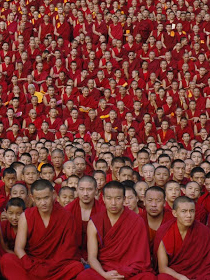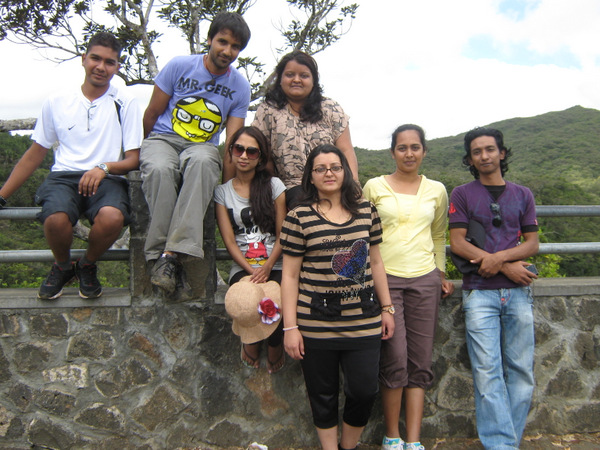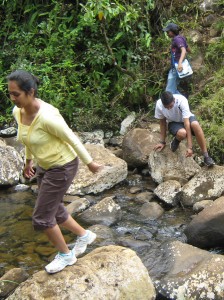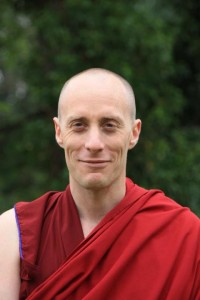- Home
- FPMT Homepage
Foundation for the Preservation of the Mahayana Tradition
The FPMT is an organization devoted to preserving and spreading Mahayana Buddhism worldwide by creating opportunities to listen, reflect, meditate, practice and actualize the unmistaken teachings of the Buddha and based on that experience spreading the Dharma to sentient beings. We provide integrated education through which people’s minds and hearts can be transformed into their highest potential for the benefit of others, inspired by an attitude of universal responsibility and service. We are committed to creating harmonious environments and helping all beings develop their full potential of infinite wisdom and compassion. Our organization is based on the Buddhist tradition of Lama Tsongkhapa of Tibet as taught to us by our founders Lama Thubten Yeshe and Lama Thubten Zopa Rinpoche.
- Willkommen
Die Stiftung zur Erhaltung der Mahayana Tradition (FPMT) ist eine Organisation, die sich weltweit für die Erhaltung und Verbreitung des Mahayana-Buddhismus einsetzt, indem sie Möglichkeiten schafft, den makellosen Lehren des Buddha zuzuhören, über sie zur reflektieren und zu meditieren und auf der Grundlage dieser Erfahrung das Dharma unter den Lebewesen zu verbreiten.
Wir bieten integrierte Schulungswege an, durch denen der Geist und das Herz der Menschen in ihr höchstes Potential verwandelt werden zum Wohl der anderen – inspiriert durch eine Haltung der universellen Verantwortung und dem Wunsch zu dienen. Wir haben uns verpflichtet, harmonische Umgebungen zu schaffen und allen Wesen zu helfen, ihr volles Potenzial unendlicher Weisheit und grenzenlosen Mitgefühls zu verwirklichen.
Unsere Organisation basiert auf der buddhistischen Tradition von Lama Tsongkhapa von Tibet, so wie sie uns von unseren Gründern Lama Thubten Yeshe und Lama Thubten Zopa Rinpoche gelehrt wird.
- Bienvenidos
La Fundación para la preservación de la tradición Mahayana (FPMT) es una organización que se dedica a preservar y difundir el budismo Mahayana en todo el mundo, creando oportunidades para escuchar, reflexionar, meditar, practicar y actualizar las enseñanzas inconfundibles de Buda y en base a esa experiencia difundir el Dharma a los seres.
Proporcionamos una educación integrada a través de la cual las mentes y los corazones de las personas se pueden transformar en su mayor potencial para el beneficio de los demás, inspirados por una actitud de responsabilidad y servicio universales. Estamos comprometidos a crear ambientes armoniosos y ayudar a todos los seres a desarrollar todo su potencial de infinita sabiduría y compasión.
Nuestra organización se basa en la tradición budista de Lama Tsongkhapa del Tíbet como nos lo enseñaron nuestros fundadores Lama Thubten Yeshe y Lama Zopa Rinpoche.
A continuación puede ver una lista de los centros y sus páginas web en su lengua preferida.
- Bienvenue
L’organisation de la FPMT a pour vocation la préservation et la diffusion du bouddhisme du mahayana dans le monde entier. Elle offre l’opportunité d’écouter, de réfléchir, de méditer, de pratiquer et de réaliser les enseignements excellents du Bouddha, pour ensuite transmettre le Dharma à tous les êtres. Nous proposons une formation intégrée grâce à laquelle le cœur et l’esprit de chacun peuvent accomplir leur potentiel le plus élevé pour le bien d’autrui, inspirés par le sens du service et une responsabilité universelle. Nous nous engageons à créer un environnement harmonieux et à aider tous les êtres à épanouir leur potentiel illimité de compassion et de sagesse. Notre organisation s’appuie sur la tradition guéloukpa de Lama Tsongkhapa du Tibet, telle qu’elle a été enseignée par nos fondateurs Lama Thoubtèn Yéshé et Lama Zopa Rinpoché.
Visitez le site de notre Editions Mahayana pour les traductions, conseils et nouvelles du Bureau international en français.
Voici une liste de centres et de leurs sites dans votre langue préférée
- Benvenuto
L’FPMT è un organizzazione il cui scopo è preservare e diffondere il Buddhismo Mahayana nel mondo, creando occasioni di ascolto, riflessione, meditazione e pratica dei perfetti insegnamenti del Buddha, al fine di attualizzare e diffondere il Dharma fra tutti gli esseri senzienti.
Offriamo un’educazione integrata, che può trasformare la mente e i cuori delle persone nel loro massimo potenziale, per il beneficio di tutti gli esseri, ispirati da un’attitudine di responsabilità universale e di servizio.
Il nostro obiettivo è quello di creare contesti armoniosi e aiutare tutti gli esseri a sviluppare in modo completo le proprie potenzialità di infinita saggezza e compassione.
La nostra organizzazione si basa sulla tradizione buddhista di Lama Tsongkhapa del Tibet, così come ci è stata insegnata dai nostri fondatori Lama Thubten Yeshe e Lama Zopa Rinpoche.
Di seguito potete trovare un elenco dei centri e dei loro siti nella lingua da voi prescelta.
- 欢迎 / 歡迎
简体中文
“护持大乘法脉基金会”( 英文简称:FPMT。全名:Foundation for the Preservation of the Mahayana Tradition) 是一个致力于护持和弘扬大乘佛法的国际佛教组织。我们提供听闻,思维,禅修,修行和实证佛陀无误教法的机会,以便让一切众生都能够享受佛法的指引和滋润。
我们全力创造和谐融洽的环境, 为人们提供解行并重的完整佛法教育,以便启发内在的环宇悲心及责任心,并开发内心所蕴藏的巨大潜能 — 无限的智慧与悲心 — 以便利益和服务一切有情。
FPMT的创办人是图腾耶喜喇嘛和喇嘛梭巴仁波切。我们所修习的是由两位上师所教导的,西藏喀巴大师的佛法传承。
繁體中文
護持大乘法脈基金會”( 英文簡稱:FPMT。全名:Found
ation for the Preservation of the Mahayana Tradition ) 是一個致力於護持和弘揚大乘佛法的國際佛教組織。我們提供聽聞, 思維,禪修,修行和實證佛陀無誤教法的機會,以便讓一切眾生都能 夠享受佛法的指引和滋潤。 我們全力創造和諧融洽的環境,
為人們提供解行並重的完整佛法教育,以便啟發內在的環宇悲心及責 任心,並開發內心所蘊藏的巨大潛能 — 無限的智慧與悲心 – – 以便利益和服務一切有情。 FPMT的創辦人是圖騰耶喜喇嘛和喇嘛梭巴仁波切。
我們所修習的是由兩位上師所教導的,西藏喀巴大師的佛法傳承。 察看道场信息:
- FPMT Homepage
- News/Media
-
- Study & Practice
-
-
- About FPMT Education Services
- Latest News
- Programs
- New to Buddhism?
- Buddhist Mind Science: Activating Your Potential
- Heart Advice for Death and Dying
- Discovering Buddhism
- Living in the Path
- Exploring Buddhism
- FPMT Basic Program
- FPMT Masters Program
- FPMT In-Depth Meditation Training
- Maitripa College
- Lotsawa Rinchen Zangpo Translator Program
- Universal Education for Compassion & Wisdom
- Online Learning Center
-
- Prayers & Practice Materials
- Overview of Prayers & Practices
- Full Catalogue of Prayers & Practice Materials
- Explore Popular Topics
- Benefiting Animals
- Chenrezig Resources
- Death & Dying Resources
- Lama Chopa (Guru Puja)
- Lama Zopa Rinpoche: Compendium of Precious Instructions
- Lama Zopa Rinpoche: Life Practice Advice
- Lama Zopa Rinpoche Practice Series
- Lamrim Resources
- Mantras
- Prayer Book Updates
- Purification Practices
- Sutras
- Thought Transformation (Lojong)
- Audio Materials
- Dharma Dates - Tibetan Calendar
- Translation Services
- Publishing Services
- Ways to Offer Support
- Prayers & Practice Materials
-
- Teachings and Advice
- Find Teachings and Advice
- Lama Zopa Rinpoche Advice Page
- Lama Zopa Rinpoche: Compendium of Precious Instructions
- Lama Zopa Rinpoche Video Teachings
- ༧སྐྱབས་རྗེ་བཟོད་པ་རིན་པོ་ཆེ་མཆོག་ནས་སྩལ་བའི་བཀའ་སློབ་བརྙན་འཕྲིན།
- Podcasts
- Lama Yeshe Wisdom Archive
- Buddhism FAQ
- Dharma for Young People
- Resources on Holy Objects
- Teachings and Advice
-
-
*If a menu item has a submenu clicking once will expand the menu clicking twice will open the page.
-
-
- Centers
-
- Teachers
-
- Projects
-
-
-
-
*If a menu item has a submenu clicking once will expand the menu clicking twice will open the page.
-
-
- FPMT
-
-
-
-
-
Live with compassion. Work with compassion. Die with compassion. Meditate with compassion. Enjoy with compassion. When problems come, experience them with compassion.
Lama Zopa Rinpoche
-
-
-
- Shop
-
-
-
The Foundation Store is FPMT’s online shop and features a vast selection of Buddhist study and practice materials written or recommended by our lineage gurus. These items include homestudy programs, prayers and practices in PDF or eBook format, materials for children, and other resources to support practitioners.
Items displayed in the shop are made available for Dharma practice and educational purposes, and never for the purpose of profiting from their sale. Please read FPMT Foundation Store Policy Regarding Dharma Items for more information.
-
-
Mandala
FPMT News Around the World
As part of their program, Dharmarakshita Study Group, in Vacoas, Mauritius, makes a group outing three times a year. In October 2012, study group members went to Alexandra Falls in the south of Mauritius Island.
“We had a one-and-a-half-hour walk in the forest to the falls and back. Then we shared a light lunch,” writes Vimla Koonja, study group coordinator. “This time only few members made it out of 22. They were Milly, Tooshma, Eeshita, Nishal, Yashveer, Ashwan, Nitish, Kirran, Vanessa and myself.”
With 160 centers, projects and services around the globe, there is always news on FPMT activities, teachers and events. Mandala hopes to share as many of these timely stories as possible. If you have news you would like to share, please let us know.
If you like what you read on Mandala, consider becoming a Friend of FPMT, which supports our work.
- Tagged: dharmarakshita study group, mandala
- 0
19
Excerpt from Joyce Morgan’s and Conrad Walters’ “Key to the Cave”

Paul Pelliot, who arrived after Stein at the Caves of a Thousand Buddhas, in the Library Cave, 1908. Photo by Charles Nouette (1869-1910), Public domain, via Wikimedia Commons.
Journeys on the Silk Road: A Desert Explorer, Buddha’s Secret Library, and the Unearthing of the World’s Oldest Printed Book, by journalists Joyce Morgan and Conrad Walters, tells the story of the explorer Aurel Stein’s 1906-8 expedition to Caves of the Thousand Buddhas near Dunhuang, China. Stein and his men traveled along the old silk trade routes, skirting the Taklamakan and Gobi Deserts. They raced to beat other explorers to the old Buddhist grottos where Stein had heard a vast trove of ancient texts had been uncovered in what came to be known as the “Library Cave.”
Read an excerpt from chapter 8.
From Mandala October-December 2012
- Tagged: dharma in the modern world, mandala
- 0
16
FPMT’s Statement on Ven. Tunden’s Death
FPMT has shared the following statement in response to the death of Ven. Tunden at Nalanda Monastery:
We are profoundly saddened to learn of the tragic passing of Ven. Tunden and offer our sincere condolences to his family, and the Nalanda community where he resided during the past five years. A puja was conducted for Ven. Tunden at Maitripa College led by Yangsi Rinpoche on November 15, 2012. We encourage the recitation of prayers for Ven. Tunden and his family.
The monastery has also posted the following announcement on their Facebook page:
To all our family and friends,
As you may have heard we have some very sad news to pass to you.
Our brother Tunden took his own life here at Nalanda Monastery at 17:00 yesterday (15 November).
Venerable Tunden was 38 years old from the UK, and had been living in the monastery for the last five years. He did not leave any message, and nothing indicated that he was about to carry out such action.
It seems that he poured a can of gasoline over his body before setting it alight. Unfortunately, the first people and the emergency services on the scene were unable to help. In the current state of the enquiry, it is not possible to determine with certainty what led him to such an extreme act.
Our thoughts and prayers go out to Tunden’s family and we are working closely with them to take care of their wishes.
We will try to keep you updated with any other information including appropriate arrangements
Please add Tunden and his family to your prayers and dedications.
UPDATE: Nalanda Monastery has sent out a message to the community, which you can read here.
14
Sarah Shifferd, long-time columnist for Mandala, shares her own experiences from online dating and offers ten ground rules for transforming it into a spiritual practice. If online dating is a part of your life (or even something you’re just curious about), Shifferd’s piece will give you something fresh, honest, and humorous to think about.
“I said I would never do it. In fact, I occasionally made my disdain for online dating known, complaining about the shallowness of the internet age and the resultant loss of basic human connection.
“But whenever the words, ‘I will never …’ leave my mouth, that’s a sure sign the activity mentioned is imminent. So it was with only mild surprise that I found myself typing o-k-c-u-p-i-d-.-c-o-m into my browser one day in January and signing up. I wanted to widen my social circles beyond the Buddhist community in which I had worked, studied, practiced and taught for the previous eight years. I wanted to overcome some deep inner fear. And I wanted to see if all I knew about practice could be taken into the real world, where people had no idea I was supposed to be practicing at all.”
From Mandala July-September 2012.
12
Khadro-la on Mitigating the Potential Damage of U.S. Earthquakes
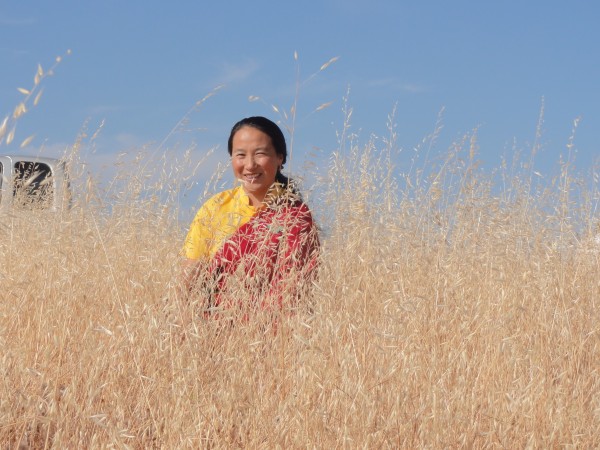
Khadro-la at Land of Calm Abiding, California, United States, June 2012. Photo by Ven. Holly Ansett.
Editor Laura Miller talks to Khadro-la about earthquakes on the United States’ West Coast and what she and Lama Zopa Rinpoche are doing to help mitigate any potential damage.
From Mandala October-December 2012
9
An Interview with Åge Delbanco
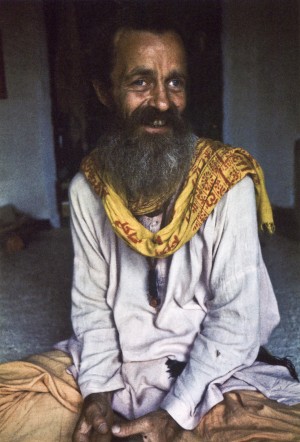
Åge (pronounced Oh-wa) Delbanco, a Danish hippie and spiritual seeker who was given the nickname Babaji, and who became an early student of the Lamas. Photo from 1970.
In the late 1960s, Åge Delbanco (also known as Babaji) followed the “hippie trail” from Denmark to India and then found his way up Kopan Hill in Nepal. He arrived about a year after Lama Yeshe, Lama Zopa Rinpoche and Zina Rachevsky had begun creating what would become Kopan Monastery. Later, he went to Vajrapani Institute in Boulder Creek, California, and ended up staying for 13 years. Wolf Price talked to Åge about the early years at Kopan and the time he spent at Vajrapani.
“[In Kopan] Lama Yeshe would be so accepting of everything. There was this English girl who came and she wanted to meditate. She sat down in her room and didn’t eat, didn’t sleep, she just sat down and meditated. I thought that was not so good, but Lama Yeshe said, ‘Oh meditation, very good, very good.’
“I think she meditated for two weeks and then keeled over exhausted. Her father came at that time and brought her home. Later she wrote a letter to Lama, thanked him, and said it was great to go through that and not be stopped. It was always like that. I had all these ideas – Western ideas about what was good and what was bad, right and wrong. It always turned out that I didn’t know what I was believing.”
From Mandala April-June 2012.
- Tagged: age delbanco, mandala, your community
- 0
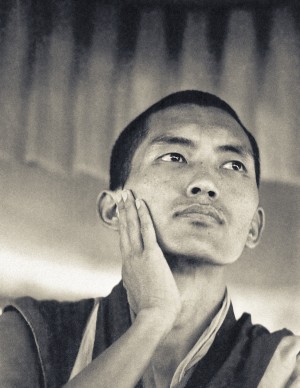
Lama Zopa Rinpoche teaching at the Sixth Kopan Course, March 1974, when he gave his most extensive teachings on the eight worldly dharmas. Photo by Ursula Bernis.
Lama Zopa Rinpoche teaches extensively on “the dissatisfied mind of desire”:
“Whether we are a Dharma practitioner or not, every problem in life comes from our own mind, as does every happiness. The cause of suffering is not external; the cause of happiness is not external. It is within us, in our mind.
“The particular thing that has created all the problems of life is the dissatisfied mind of desire, the mind clinging to this life. We try to obtain the immediate happiness of this life through what we call the eight worldly dharmas: a desire for comfort, material things (such as gifts, friends and so forth), a good reputation and praise, and an aversion to a lack of comfort and material things, a bad reputation and criticism, or blame.”
This teaching is excerpted from How to Practice Dharma: Teachings on the Eight Worldly Dharmas, edited by Gordon McDougall.
From Mandala July-September 2011.
8
ever mind, a poem
Craig Matsu-Pissot submitted “ever mind” to Mandala to our great pleasure. It reads like a meditation on the nature of the mind and is certainly worth lingering over.
“… shadows of behaviors which have appeared repetitively / like the passing cars of a ghost train / which of course leads back to a birth place no longer relevant …”
From Mandala January-March 2010.
- Tagged: mandala, poetry, your words
- 0
6
Abbot Geshe Jamphel Explores What It Means “To Be Truly Free”

Photo by fdecomite via Flickr. Creative Commons Attribution.
In a time when there is a heightened awareness of global terror and especially during the American presidential elections, the word “freedom” is often heard. But what does “freedom” mean from a Buddhist perspective? During teachings on Shantideva’s Bodhisattva’s Way of Life, Geshe Jamphel, abbot and resident teacher of Nalanda Monastery in France, explores this question.
“We can look at freedom in different contexts. For example, we don’t wish for the weather to be too hot or too cold, we don’t want to be thirsty, and we don’t want to be hungry; we want to be healthy and not ill. However, things do not always arise as we wish them too. Therefore, we can clearly see that we don’t have freedom,” writes Geshe Jamphel. “Also, in a free country like France, there are still people living in situations of unbearable suffering, which may lead them to commit suicide. You could even say that such a person is less free than someone in prison. If we do not make effort to be liberated from the afflictions, our mind will deteriorate into such states. In short, if we don’t make effort to construct a path that is liberating us from samsara, we can construct as many freedoms as we want in this world, but we will never be free.”
Read more on fpmt.org/mandala/.
From Mandala October-December 2008.
- Tagged: freedom, geshe jamphel, mandala, politics, teachings and advice
- 0
5
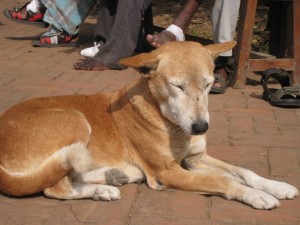
Dog warming in sun, January 2012. Photo by Phil Hunt.
Leah Richards, a veterinary nurse, has a deep love, compassion, and respect for all animals and hopes to be a veterinarian one day. While at the 2003 Kopan course, she asked Lama Zopa Rinpoche for guidance on what to do when asked to perform euthanasia on sick and suffering animals.
From Mandala October-November 2004.
- Tagged: animals, green tara, lama zopa rinpoche, mandala, taking care of others, teachings and advice
- 0
2
Why Is It So Difficult to Forgive Ourselves and Others?

Ven. Rita Riniker
“Somehow, we have this arrogant idea that we should be able to protect ourselves from all harm from others as if we are superheroes and perfect,” writes Swiss-born Ven. Rita Riniker. “If we get hurt, our ego is not happy and we start to hate ourselves for not being perfect. That in turn makes us feel very important. Although it is not a happy feeling, we prefer to be an unhappy, important somebody than a relaxed, happy nobody. Feeling hurt is perfect food for the ego. It makes it really big, but also very vulnerable and weak. In that way, the target to be hurt again becomes even bigger.”
Read Ven. Rita’s complete answer on fpmt.org/mandala/.
From Mandala January-March 2009.
- Tagged: mandala, teachings and advice
- 0
1
The Hidden Toll of Australia’s 2011 Floods

An orphaned possum joey being examined, 2011. Photo by Tania Duratovic.
“The start of 2011 saw the Australian state of Queensland experience some of the worst flooding in history, resulting in three-quarters of the state, an area the size of France and Germany combined, being declared a disaster zone. Stretching from remote farming communities to the state’s capital, Brisbane, the floods killed 35 people and affected the lives of more than 200,000. The hidden toll, as in many disasters, however, was the thousands of injured, orphaned and deceased animals.”
From Mandala July-September 2011.
- Tagged: mandala, taking care of others
- 0
- Home
- News/Media
- Study & Practice
- About FPMT Education Services
- Latest News
- Programs
- New to Buddhism?
- Buddhist Mind Science: Activating Your Potential
- Heart Advice for Death and Dying
- Discovering Buddhism
- Living in the Path
- Exploring Buddhism
- FPMT Basic Program
- FPMT Masters Program
- FPMT In-Depth Meditation Training
- Maitripa College
- Lotsawa Rinchen Zangpo Translator Program
- Universal Education for Compassion & Wisdom
- Online Learning Center
- Prayers & Practice Materials
- Overview of Prayers & Practices
- Full Catalogue of Prayers & Practice Materials
- Explore Popular Topics
- Benefiting Animals
- Chenrezig Resources
- Death & Dying Resources
- Lama Chopa (Guru Puja)
- Lama Zopa Rinpoche: Compendium of Precious Instructions
- Lama Zopa Rinpoche: Life Practice Advice
- Lama Zopa Rinpoche Practice Series
- Lamrim Resources
- Mantras
- Prayer Book Updates
- Purification Practices
- Sutras
- Thought Transformation (Lojong)
- Audio Materials
- Dharma Dates – Tibetan Calendar
- Translation Services
- Publishing Services
- Teachings and Advice
- Find Teachings and Advice
- Lama Zopa Rinpoche Advice Page
- Lama Zopa Rinpoche: Compendium of Precious Instructions
- Lama Zopa Rinpoche Video Teachings
- ༧སྐྱབས་རྗེ་བཟོད་པ་རིན་པོ་ཆེ་མཆོག་ནས་སྩལ་བའི་བཀའ་སློབ་བརྙན་འཕྲིན།
- Podcasts
- Lama Yeshe Wisdom Archive
- Buddhism FAQ
- Dharma for Young People
- Resources on Holy Objects
- Ways to Offer Support
- Centers
- Affiliates Area
- Teachers
- Projects
- Charitable Projects
- Make a Donation
- Applying for Grants
- News about Projects
- Other Projects within FPMT
- Support International Office
- Projects Photo Galleries
- Give Where Most Needed
- FPMT
- Shop
Subscribe to FPMT News
Translate*
*powered by Google TranslateTranslation of pages on fpmt.org is performed by Google Translate, a third party service which FPMT has no control over. The service provides automated computer translations that are only an approximation of the websites' original content. The translations should not be considered exact and only used as a rough guide.Whatever problem one experiences if one thinks about the benefits of problems and how they are beneficial for ones own life, to develop ones mind in compassion, to develop loving kindness, patience, wisdom, and all the positive qualities for the path to liberation. By thinking of the benefits one develops this precious quality, this most healthy positive way of thinking that brings happiness and that stops you from harming yourself and stops you from harming others.







